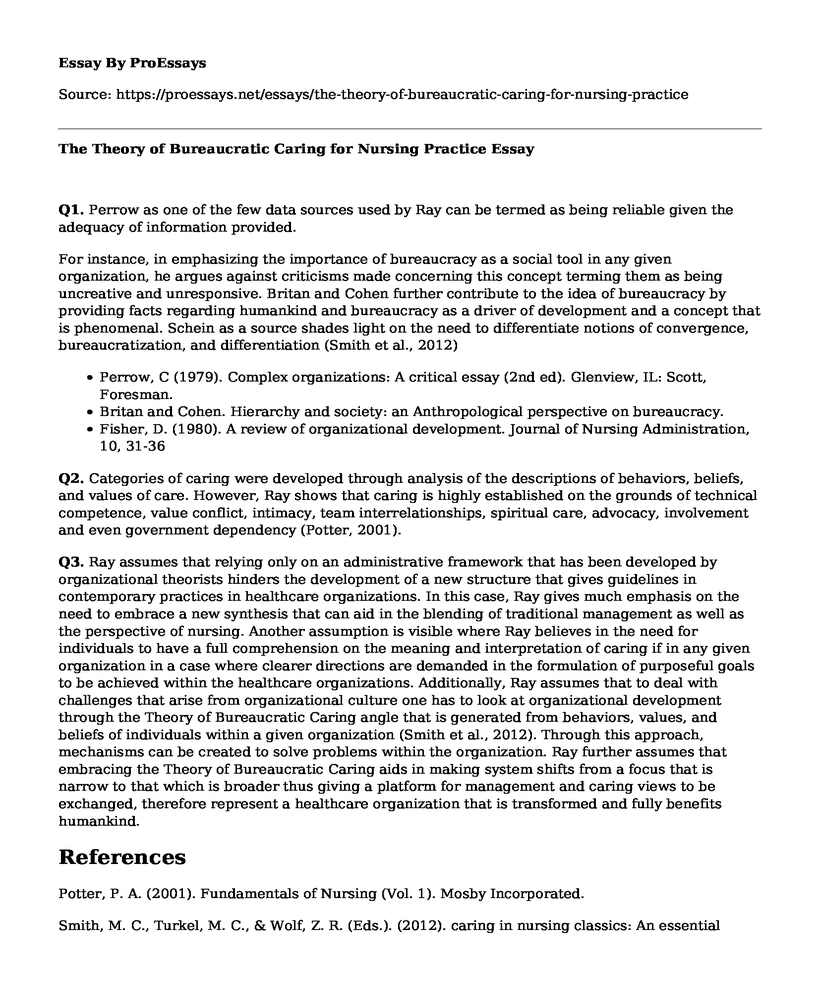Q1. Perrow as one of the few data sources used by Ray can be termed as being reliable given the adequacy of information provided.
For instance, in emphasizing the importance of bureaucracy as a social tool in any given organization, he argues against criticisms made concerning this concept terming them as being uncreative and unresponsive. Britan and Cohen further contribute to the idea of bureaucracy by providing facts regarding humankind and bureaucracy as a driver of development and a concept that is phenomenal. Schein as a source shades light on the need to differentiate notions of convergence, bureaucratization, and differentiation (Smith et al., 2012)
- Perrow, C (1979). Complex organizations: A critical essay (2nd ed). Glenview, IL: Scott, Foresman.
- Britan and Cohen. Hierarchy and society: an Anthropological perspective on bureaucracy.
- Fisher, D. (1980). A review of organizational development. Journal of Nursing Administration, 10, 31-36
Q2. Categories of caring were developed through analysis of the descriptions of behaviors, beliefs, and values of care. However, Ray shows that caring is highly established on the grounds of technical competence, value conflict, intimacy, team interrelationships, spiritual care, advocacy, involvement and even government dependency (Potter, 2001).
Q3. Ray assumes that relying only on an administrative framework that has been developed by organizational theorists hinders the development of a new structure that gives guidelines in contemporary practices in healthcare organizations. In this case, Ray gives much emphasis on the need to embrace a new synthesis that can aid in the blending of traditional management as well as the perspective of nursing. Another assumption is visible where Ray believes in the need for individuals to have a full comprehension on the meaning and interpretation of caring if in any given organization in a case where clearer directions are demanded in the formulation of purposeful goals to be achieved within the healthcare organizations. Additionally, Ray assumes that to deal with challenges that arise from organizational culture one has to look at organizational development through the Theory of Bureaucratic Caring angle that is generated from behaviors, values, and beliefs of individuals within a given organization (Smith et al., 2012). Through this approach, mechanisms can be created to solve problems within the organization. Ray further assumes that embracing the Theory of Bureaucratic Caring aids in making system shifts from a focus that is narrow to that which is broader thus giving a platform for management and caring views to be exchanged, therefore represent a healthcare organization that is transformed and fully benefits humankind.
References
Potter, P. A. (2001). Fundamentals of Nursing (Vol. 1). Mosby Incorporated.
Smith, M. C., Turkel, M. C., & Wolf, Z. R. (Eds.). (2012). caring in nursing classics: An essential resource. Springer Publishing Company.
Cite this page
The Theory of Bureaucratic Caring for Nursing Practice. (2022, Apr 14). Retrieved from https://proessays.net/essays/the-theory-of-bureaucratic-caring-for-nursing-practice
If you are the original author of this essay and no longer wish to have it published on the ProEssays website, please click below to request its removal:
- The Worst Fat in the Food Supply - Public Health Essay Sample
- Venepuncture and Cannulation Essay
- Essay Sample on Prevention and Control of Lung Cancer
- Essay Sample on Bad Effects of E-Cigarettes
- Nutritional Requirements During Pregnancy: Understanding Health Risks - Essay Sample
- Women Exclusion from Mainstream News: A Legacy since 18th Century - Essay Sample
- Paper Example on Core Temp & Cardiovascular Drift: Prolonged Exercise Implications







